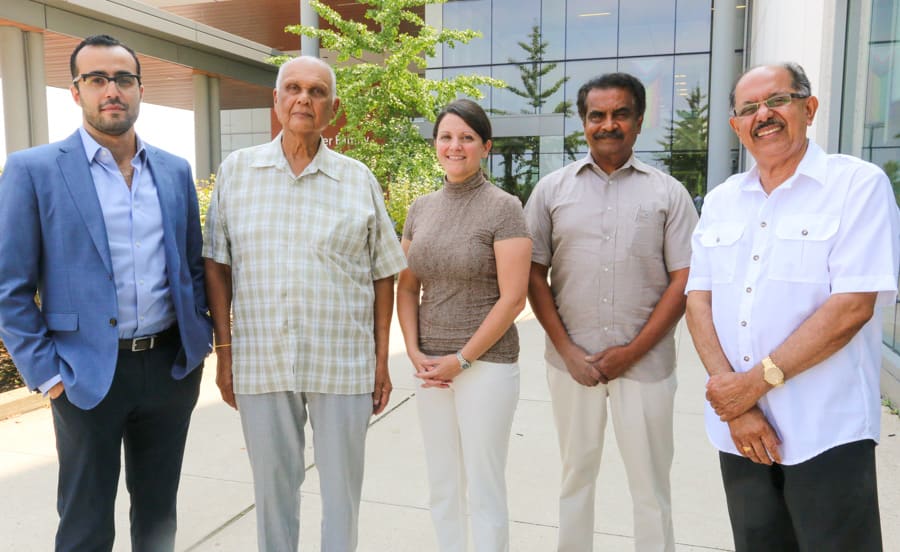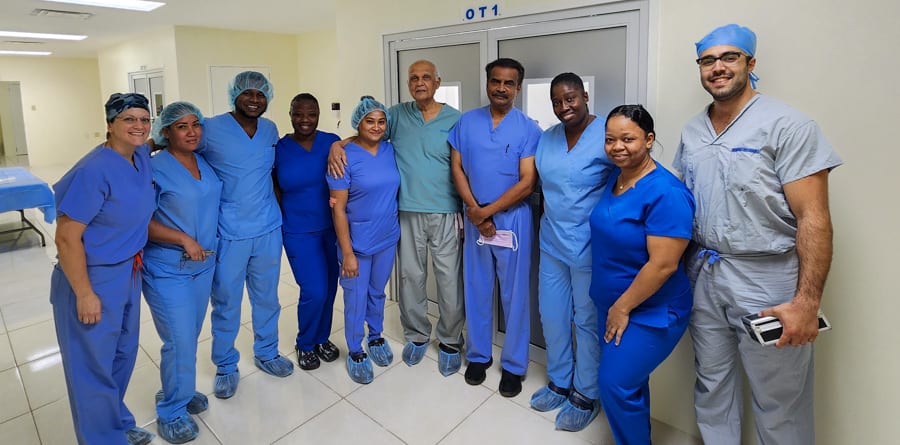We are Niagara Health is a series of stories that celebrates the incredible people working and volunteering in our organization and how they make a difference in the lives of patients and coworkers every day.

(From left: Drs. Faysal Naji, Budhendranauth Doobay, Jennifer Frendo, Surianarayanan Rammohan travel to Guyana three to four times a year to help perform fistula procedures for patients with kidney disease receiving dialysis treatment. They are joined by friend and supporter Ray Doobay (far right).
While some of us are making plans to relax this weekend, a team of Niagara Health physicians is readying to travel to Guyana to provide healthcare to people facing barriers.
Led by retired vascular surgeon Dr. Budhendranauth Doobay, fellow vascular surgeons Dr. Surianarayanan Rammohan and Dr. Faysal Naji, and family physician Dr. Jennifer Frendo will perform fistula procedures to create long-lasting dialysis access points for patients with kidney disease.
Some in the group have been making the trip regularly since 2010 after Dr. Doobay travelled to his birth nation and noticed significant need for improved kidney disease treatment, particularly for patients in late stages of the illness.
Fistula procedures, which connect an artery and vein, and can withstand dialysis treatment several times a week for years without collapsing, aren’t common practice in Guyana, Dr. Doobay says. Without proper, sustained treatment, which fistulas can facilitate, kidney disease can be fatal.
Lack of access to government-funded dialysis is another hurdle Guyanese patients face, he notes. There are also not enough dialysis machines at private, for-profit clinics to meet demand and treatment is costly – about US$150 per dialysis session and US$500 per fistula surgery.
“I saw people on dialysis and I asked what happens when the body runs out (and dialysis can no longer be done),” Dr. Doobay recalled. “I was told they go home and they die.”
That answer wasn’t good enough for the physician. He connected with colleagues in Canada to drum up support for establishing a dialysis clinic in his hometown of Annandale where patients could come for treatment after he performed a fistula procedure on them at a public hospital with an operating room.
“Without this, people will die. It’s that black and white."

Niagara Health physicians gather with their colleagues during a trip to Guyana to perform fistula procedures for patients with kidney disease.
Dr. Doobay learned the procedure from his former protégé Dr. Rammohan. He also got a donation of six decommissioned dialysis machines from Humber River Hospital to start. Within six months, his clinic was up and running, funded by himself and the generosity of others.
There was still more to be done, however, and soon he recruited Dr. Rammohan and colleague Dr. Frendo, who is also a surgical assistant, to make the journey with him. Together, they self-finance travel and lodging to perform fistula surgeries with their own equipment up to four weekends a year.
“It’s very fulfilling and it’s very direct help,” Dr. Frendo says. “Without this, people will die. It’s that black and white. There’s a lot of grey areas in medicine, but this is not a grey area at all.”
More recently, Dr. Naji, who joined Niagara Health three years ago and has been mentored by Dr. Rammohan, was invited to join the efforts.
“It’s been amazing,” Dr. Naji says. “The first two times I went, we did surgery at a public hospital. It’s a drastic change from the setting we operate in here. It’s a low-resource setting.”
But the situation for patients in Guyana is improving thanks to the quartet’s humanitarian work. They’ve secured more decommissioned equipment from other hospitals, including mattresses from Niagara Health when the organization switched to gel surfaces earlier this year.
A group of physicians from McMaster University also donated $50,000 to buy filters for dialysis machines. Nephrologists from Mac regularly make the journey to do patient assessments and followup. And the Dr. Doobay-led group fundraises by participating in the Toronto Marathon each October.
Thanks to those contributions, the six patients Dr. Doobay started with all those years ago has swelled to more than 135. He has also set up dialysis clinics in two other Guyanese communities with a third in the works, and opened his own operating room, reducing reliance on government hospital space to perform fistula surgeries. The Niagara Health team used it for the first time earlier this summer, doing 25 procedures over one weekend.
“Dialysis is not an easy thing,” Dr. Rammohan says. “You can’t buy a dialysis machine and plug it into a wall. You need a supply of clean and sterile water. (Dr. Doobay) said ‘I’m going to do it’ and he did. And we all got on the bandwagon. We feel fortunate we’re able to provide this service.”
There have been skeptics along the way. Dr. Rammohan admits he used to be one. But Dr. Doobay has been undeterred in helping people access critical healthcare.
“Helping someone with dialysis and contributing in whatever way we can, you’re saving a life,” Dr. Doobay says. “There’s no better feeling than saving a life.”

